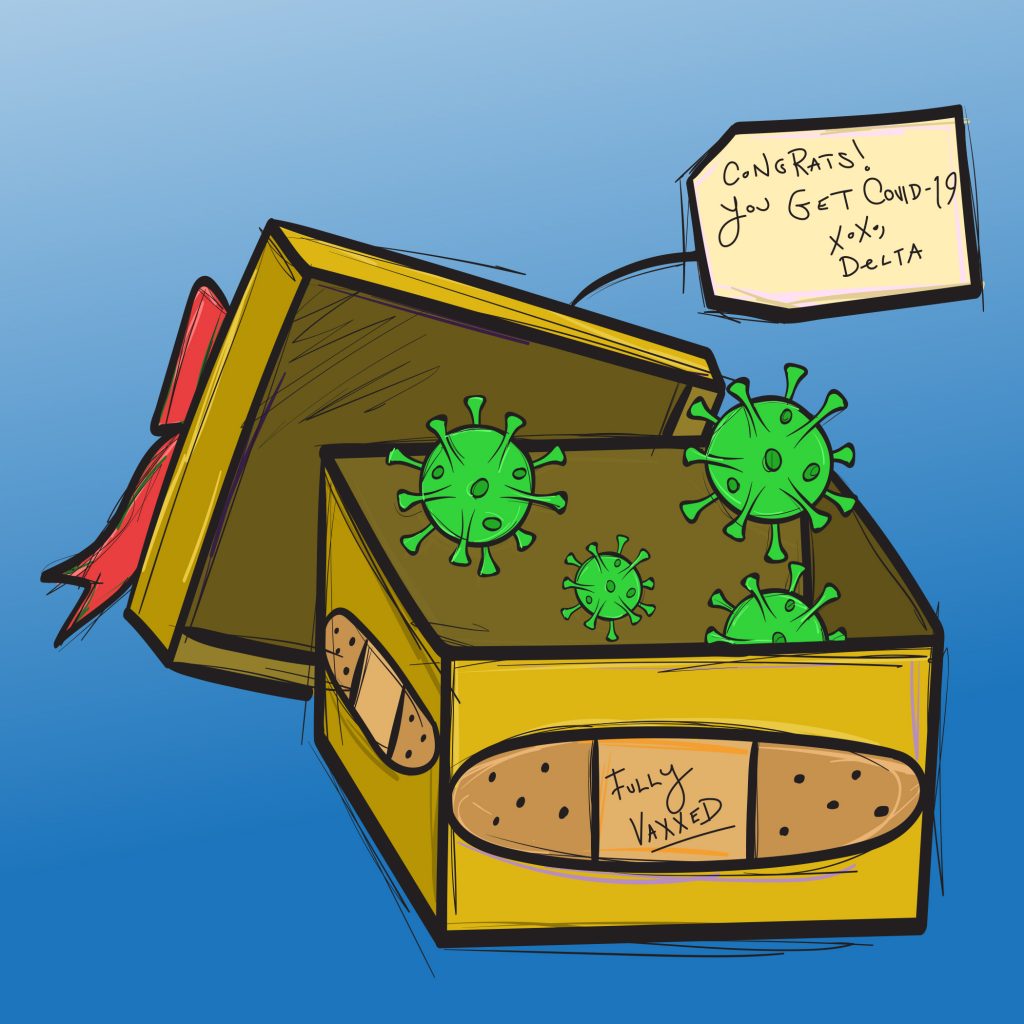On Tuesday, Sept. 7, Binghamton University students received a B-Line News Addition containing a message from BU President Harvey Stenger about COVID-19 on campus. In this message, Stenger expressed concerns about an “uptick” in COVID-19 cases within the community, urging students to avoid parties and large indoor gatherings to maintain a safe, healthy campus community.
However, the word “uptick” may be an understatement.
During the week of Aug. 29, BU saw a massive influx students testing positive for COVID-19. The Delta variant poses a significant threat to campus communities in particular because of the difference in symptoms from previous coronavirus strains. The return to campus is often accompanied by common colds, allergy season and trips to nearby health centers. However, this makes for a tricky situation when determining the true cause of one’s illness, and uncertainty among students can easily allow the variant to spread further. While not definite, the return of BU’s annual University Fest to in-person tabling is a probable cause for some of these cases. Though the University is not necessarily to blame for the spread, especially considering the large weekend crowds in Downtown Binghamton, the sudden increase in student cases laid bare the lack of sufficient resources on campus.
As students continued testing positive, many were quick to discover just how difficult it has become to find the testing we need at BU. For starters, the on-campus Decker Student Health Services Center was completely unreachable for a significant portion of this time period. Completely overwhelmed by the amount of students who wanted testing, many students in desperate need of testing were met with unanswered dial tones for days on end. If students were to turn to the Broome County Health Department hotline, the result was the same. With no answer from these local health services, the next reasonable step for many students was to schedule a free test in the University Union. However, students with symptoms were not allowed to use this on-campus testing, being turned away at the site. Facing a national supply shortage of COVID-19 tests, some of the closest pharmacies with available testing appointments were either located in entirely different states or at least two days away — not to mention that many of these same pharmacies were sold out of at-home tests.
Even if students were to locate a COVID-19 test despite these hardships and receive news of an official positive result, the hardships did not end there. The inability to contact either Decker Student Health Services or the Broome County Health Department not only made it harder to access testing, but also made it more difficult for students to report their positive cases to campus as a student case. The SUNY COVID-19 tracker currently estimates that BU has had 186 positive cases over the last 14-day rolling period. While this may not sound bad in a campus of nearly 18,000 students, the difficult reporting process makes these statistics questionable at best. Students who tested positive were also told to expect a daily call from Broome County which repeatedly stated the importance of remaining in isolation and offered up resources for anyone who needed help accessing groceries, general information and medical or mental health services. This expectation was not met, with few students receiving any calls, let alone the 10 calls promised for each day of isolation. Subsequent contact tracing was also heavily delayed and obviously disorganized, making efforts to stop the spread all but futile.
Following such glaring oversight, students are left with one question: where did all the University infrastructure go?
BU quickly emerged as a leader in COVID-19 response when the pandemic began. The University was the first SUNY school to refund students for all unused fees as they left campus in March of 2020, first to mandate vaccines for on-campus students living in dorms and off-campus students with in-person classes and one of the only SUNY schools to host New York State Gov. Andrew Cuomo as the pandemic began. BU was quick to establish a robust surveillance testing program which put many students at ease as well as participate in the innovative, albeit brief, implementation of an on-campus vaccination site.
To be clear, we as students don’t expect the University to handle something as unpredictable as a pandemic perfectly. Instead, students are simply asking for the same care and consideration at this stage of the pandemic that we knew the University was capable of at its beginning. While we commend the University for quickly expanding the on-campus testing center to alleviate campus concerns, the administration could and should have predicted this outcome given Delta’s insurgence throughout the summer. Although a majority of positive cases are breakthrough cases among a predominantly vaccinated campus community, students are still unnerved. The lack of severity on physical symptoms has not necessarily alleviated those symptoms that are mental. A sudden and dramatic “uptick” in cases without sufficient University resources leaves many feeling unnerved and anxious. Some students may be lucky enough to take classes with understanding professors, but others could easily be less accommodating. The pandemic shed light on an opportunity to revolutionize education, making accessibility a priority — strict attendance policies and rigid policies have no place in this necessary shift in schooling.
We commend the University for their dedication to safety. All that we ask is for administration to be a bit more cautionary in the coming months. In doing so, our campus can continue to set precedents and present ourselves as the secure campus students have come to know and expect.



